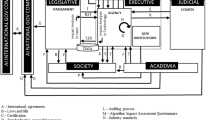Abstract
This paper considers the ways that Information Ethics (IE) treats things. A number of critics have focused on IE’s move away from anthropocentrism to include non-humans on an equal basis in moral thinking. I enlist Actor Network Theory, Dennett’s views on ‹as if’ intentionality and Magnani’s characterization of ‹moral mediators’. Although they demonstrate different philosophical pedigrees, I argue that these three theories can be pressed into service in defence of IE’s treatment of things. Indeed the support they lend to the extension of moral status to non-human objects can be seen as part of a trend towards the accommodation of non-humans into our moral and social networks. A number of parallels are drawn between philosophical arguments over artificial intelligence and information ethics.
Similar content being viewed by others
References
A. Adam. Artificial Knowing: Gender and the Thinking Machine. Routledge, London and New York, 1998.
A. Adam. Cyborgs in the Chinese Room: Boundaries Transgressed and Boundaries Blurred. In J. Preston and M. Bishop, editors, Views into the Chinese Room: New Essays on Searle and Artificial Intelligence, pages 319–337. Oxford University Press, Oxford, 2002.
A. Adam. Delegating and Distributing Morality: Can We Inscribe Privacy Protection in a Machine. Ethics and Information Technology, 7(4): 233–242, 2005.
M. Akrich. The De-Scription of Technical Objects. In W. E. Bijker and J. Law, editors, Shaping Technology/Building Society: Studies in Sociotechnical Change, pages 205–224. MIT Press, Cambridge, MA and London, 1997.
R. A. Brooks. Intelligence Without Representation. Artificial Intelligence, 47: 139–160, 1991.
H. M. Collins. Artificial Experts: Social Knowledge and Intelligent Machines. MIT Press, Cambridge, MA, 1990.
H. M. Collins and M. Kusch. The Shape of Actions: What Machines and Humans Can Do. MIT Press, Cambridge, MA and London, 1998.
D. C. Dennett. Is there an Autonomous ‹Knowledge Level’? In Z. Pylshyn and W. Demopoulos, editors, Meaning and Cognitive Structure, pages 51–54. Ablex, Norwood, NJ, 1986.
D. C. Dennett. Review of Newell, Unified Theories of Cognition. Artificial Intelligence, 59(1–2): 285–294, 1993.
D. C. Dennett. The Myth of Original Intentionality. In E. Dietrich, editor, Thinking Computers and Virtual Persons: Essays on the Intentionality of Machines, pages 91–107. Academic Press, San Diego, CA and London, 1994.
B. Easlea. Science and Sexual Oppression: Patriarchy’s Confrontation with Woman and Nature. Weidenfeld and Nicolson, London, 1981.
L. Floridi. Information Ethics, its Nature and Scope. In J. van den Hoven and J. Weckert, editors, Moral Philosophy and Information Technology. Cambridge University Press, UK, Cambridge, pp. 40–65, 2007a.
L. Floridi. Distributed Morality in Multiagent Systems Paper Presented at CEPE 2007, San Diego, 2007b. Available at http://cepe2007.sandiego.edu/abstractDetail.asp?ID=40. Accessed August 30, 2007.
L. Floridi. The Philosophy of Presence: From Epistemic Failure to Successful Observability. Presence: Teleoperators and Virtual Environments, 14(6):656–667, 2005.
K. E. Himma. There’s Something About Mary: The Moral Value of Things Qua Information Objects. Ethics and Information Technology, 6(3): 145–159, 2004.
K. E. Himma. Artificial Agency, Consciousness, and the Criteria for Moral Agency: What Properties Must an Artificial Agent Have to be a Moral Agent? Paper presented at CEPE 207, san Diego, 2007. Available at http://cepe2007.sandiego.edu/abstractDetail.asp?ID=2. Accessed August 30, 2007.
B. Latour. Where are the Missing Masses? The Sociology of a Few Mundane Artifacts. In W. E. Bijker and J. Law, editors, Shaping Technology/Building Society: Studies in Sociotechnical Change, pages 225–258. MIT Press, Cambridge, MA and London, 1997.
L. Magnani. Distributed Morality and Technological Artifacts. Paper presented at 4th International Conference on Human being in Contemporary Philosophy, Volgograd, 2007. Available at http://volgograd2007.goldenideashome.com/2%20Papers/Magnani%20Lorenzo%20p.pdf. Accessed August 30, 2007.
G. Ryle. The Concept of Mind. Hutchinson, London, 1963.
J. R. Searle. Minds, Brains and Programs. In R. Born, editor, Artificial Intelligence: The Case Against. pp. 18–40. Croom Helm, London and Sydney, 1987 (first published 1980).
M. Siponen. A Pragmatic Evaluation of the Theory of Information Ethics. Ethics and Information Technology, 6(4): 279–290, 2004.
T. Williamson. Knowledge and its Limits. Oxford University Press, Oxford, 2002.
Author information
Authors and Affiliations
Corresponding author
Rights and permissions
About this article
Cite this article
Adam, A. Ethics for things. Ethics Inf Technol 10, 149–154 (2008). https://doi.org/10.1007/s10676-008-9169-3
Received:
Accepted:
Published:
Issue Date:
DOI: https://doi.org/10.1007/s10676-008-9169-3




